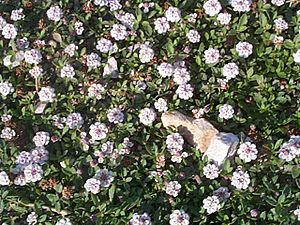Phyla dulcis facts for kids
Quick facts for kids Phyla dulcis |
|
|---|---|
 |
|
| Scientific classification |
|
| Kingdom: | Plantae |
| Clade: | Tracheophytes |
| Clade: | Angiosperms |
| Clade: | Eudicots |
| Clade: | Asterids |
| Order: | Lamiales |
| Family: | Verbenaceae |
| Genus: | Phyla |
| Species: |
P. dulcis
|
| Binomial name | |
| Phyla dulcis (Trevir.) Moldenke
|
|
| Script error: The function "autoWithCaption" does not exist. | |
| Synonyms | |
|
Lippia dulcis Trevir. |
|
Script error: No such module "Check for conflicting parameters".
Phyla dulcis is a type of plant that lives for many years. It is a soft-stemmed plant, not a woody tree or bush. This plant grows naturally in southern Mexico, the Caribbean islands (like Cuba, Hispaniola, and Puerto Rico), Central America, Colombia, and Venezuela.
People know this plant by many names. Some common ones are Aztec sweet herb, bushy lippia, and honeyherb. In Spanish, it is called hierba dulce, which means "sweet herb." The Nahuatl name is tzopelic-xihuitl. Sometimes, its small buds are sold as "dushi" or "dulce" buttons. Both words mean "sweet" in Papiamento and Spanish.
Sweet and Useful Plant
For a long time, people in Mexico and parts of Central America have used Phyla dulcis. They used it as a natural way to make things taste sweet. They also used it as a medicinal herb to help with different health issues.
The Aztecs were an ancient people who lived in Mexico. They used this plant a lot. When the Spanish arrived in Mexico, they learned about Phyla dulcis from the Aztecs.
Why It Tastes Sweet
The sweet taste of Phyla dulcis comes from a special natural chemical. This chemical is called hernandulcin. Scientists discovered hernandulcin in 1985. They named it after Francisco Hernández, a Spanish doctor. He was the first person to write about this plant way back in the 1500s.
Even though it is very sweet, Phyla dulcis is not used everywhere as a sweetener. This is because it also has a lot of bitter-tasting chemicals. One of these bitter chemicals is called camphor.

